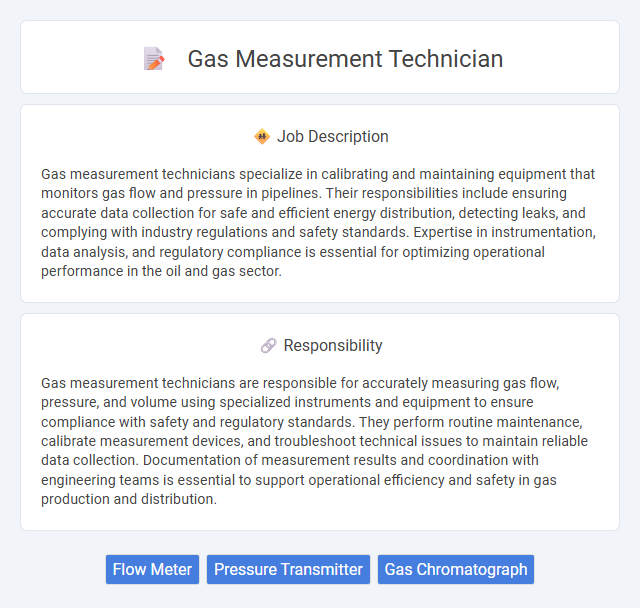
Gas measurement technicians specialize in calibrating and maintaining equipment that monitors gas flow and pressure in pipelines. Their responsibilities include ensuring accurate data collection for safe and efficient energy distribution, detecting leaks, and complying with industry regulations and safety standards. Expertise in instrumentation, data analysis, and regulatory compliance is essential for optimizing operational performance in the oil and gas sector.
Individuals with strong attention to detail and a comfort with working in potentially hazardous environments are likely to be well-suited for a gas measurement technician role. Those who can maintain focus during repetitive tasks and possess good problem-solving skills may find this job compatible with their abilities. People who have some physical fitness and are not prone to claustrophobia or respiratory issues might have a higher probability of thriving in this profession.
Qualification
Gas measurement technicians require a strong foundation in mechanical or electrical engineering, often supported by a technical diploma or associate degree in instrumentation, process technology, or related fields. Certification from recognized bodies such as the American Society of Gas Measurement Professionals (ASGMP) enhances employment prospects and ensures adherence to industry standards. Proficiency in gas flow calculations, meter installation, calibration, and safety regulations is essential for accurate and reliable gas measurement.
Responsibility
Gas measurement technicians are responsible for accurately measuring gas flow, pressure, and volume using specialized instruments and equipment to ensure compliance with safety and regulatory standards. They perform routine maintenance, calibrate measurement devices, and troubleshoot technical issues to maintain reliable data collection. Documentation of measurement results and coordination with engineering teams is essential to support operational efficiency and safety in gas production and distribution.
Benefit
Gas measurement technician roles likely offer competitive salaries and steady employment due to demand in energy and industrial sectors. Benefits may include comprehensive health coverage, retirement plans, and opportunities for overtime pay. There is also a probable chance for career advancement through specialized training and certifications.
Challenge
Gas measurement technician roles likely involve navigating complex and potentially hazardous environments that require precise data collection and analysis. Challenges may stem from maintaining accuracy amidst fluctuating gas concentrations and ensuring compliance with stringent safety regulations. This job probably demands continuous learning to keep up with evolving measurement technologies and industry standards.
Career Advancement
Gas measurement technicians play a critical role in monitoring and analyzing gas flow, pressure, and quality in industrial settings. Career advancement opportunities include transitioning to supervisory roles, specializing in advanced gas analytics, or pursuing certifications in safety and instrumentation technology. Expertise in energy sector regulations and proficiency with cutting-edge measurement technologies significantly enhance promotion prospects and salary growth.
Key Terms
Flow Meter
A Gas Measurement Technician specializes in installing, calibrating, and maintaining flow meters to ensure accurate measurement of gas volumes in pipelines. Proficiency in interpreting flow meter data and troubleshooting instrument errors is critical for optimizing gas distribution and verifying compliance with industry standards. Expertise in various types of flow meters, including ultrasonic, turbine, and coriolis, enhances the technician's ability to manage complex gas measurement systems efficiently.
Pressure Transmitter
Gas measurement technicians specialize in installing, calibrating, and maintaining pressure transmitters to ensure accurate gas pressure readings critical for pipeline safety and efficiency. These devices convert pressure data into electrical signals, enabling real-time monitoring and control of gas flow in industrial systems. Expertise in troubleshooting and optimizing pressure transmitter performance directly impacts operational reliability and compliance with industry standards.
Gas Chromatograph
Gas measurement technicians specializing in gas chromatographs play a crucial role in accurately analyzing natural gas composition for energy production and distribution. Proficiency in operating and maintaining Gas Chromatography (GC) equipment ensures precise detection of hydrocarbons, moisture, and contaminants, essential for compliance with industry standards. Expertise in data interpretation and instrument calibration directly impacts billing accuracy, safety, and regulatory adherence in the gas sector.
 kuljobs.com
kuljobs.com